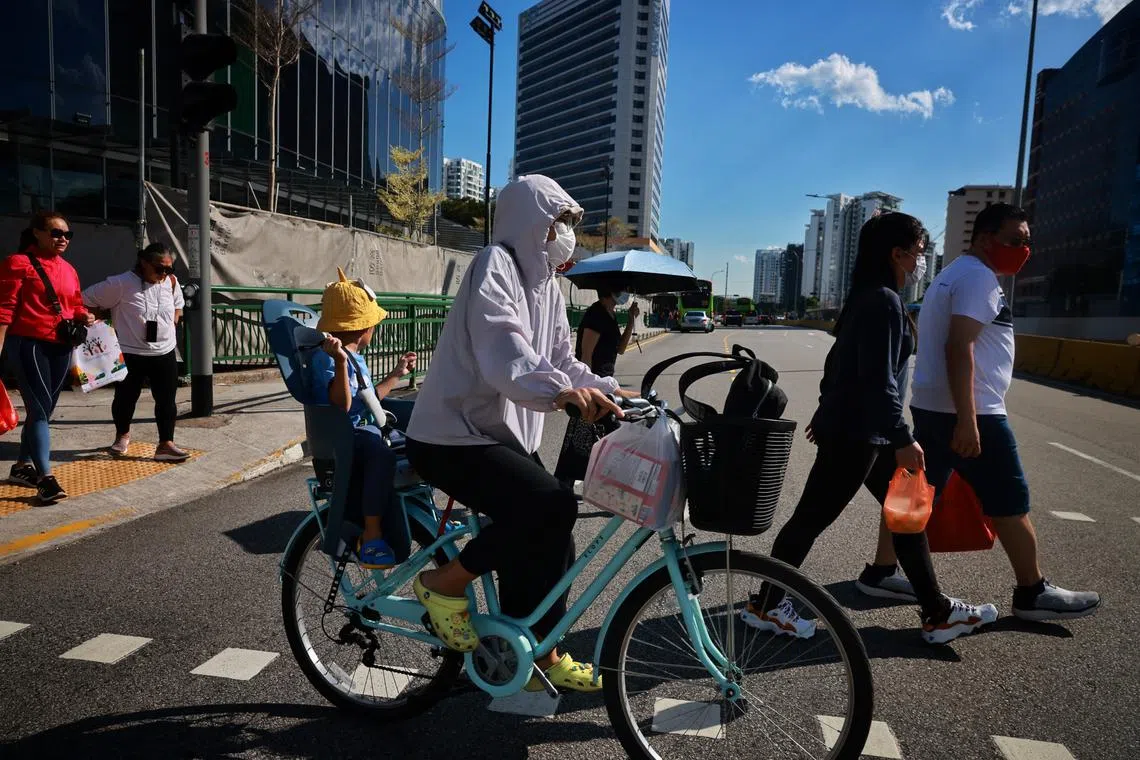NUS research centre to lead South-east Asia’s efforts in heat health and productivity
Sign up now: Get ST's newsletters delivered to your inbox

The centre will lead the way in identifying knowledge gaps, reviewing preparedness efforts and rolling out strategies to build heat resilience.
ST PHOTO: JASON QUAH
SINGAPORE - A research centre at the National University of Singapore working on building heat resilience will be tasked with leading South-east Asia’s efforts in combating rising temperatures.
The Heat Resilience and Performance Centre at the NUS Yong Loo Lin School of Medicine will be the South-east Asian node for the Global Heat Health Information Network, an information-sharing initiative by the World Health Organisation (WHO) and the World Meteorological Organisation (WMO).
The announcement was made on the sidelines of the United Nations’ COP28 climate conference, which is being held in Dubai from Nov 30 to Dec 12.
For the first time, health issues have been elevated on the climate agenda to raise awareness of how climate change affects human health, causing heat stress, polluting air and creating conditions for more vector-borne diseases.
For example, air pollution – caused mainly by the burning of fossil fuels – is responsible for more than 6.5 million deaths a year globally, a figure that is on the rise, according to a study published in 2022 in the Lancet Planetary Health journal.
The new appointment opens doors for the NUS centre to work closely with international and regional partners, said its director, Associate Professor Jason Lee.
The goal is to create and scale up efforts to protect populations from the adverse health impact of extreme ambient heat in the South-east Asian region.
“The appointment to lead the new node can help to catalyse efforts to increase coordination and generate quicker dissemination of critical information relating to heat-related health risks and interventions within the region,” said Prof Lee.
Various tropical cities in South-east Asia experience heat differently, he noted. For instance, northern Vietnam experiences seasonal heat, while places in southern Vietnam, such as Ho Chi Minh City, faces heat all year round, just like Singapore.
In sub-tropical regions like Hanoi, the sudden change in seasons from winter to summer can lead to heat stress in people if they are not able to adapt to the change in temperatures quickly enough.
In addition, extreme weather events have led to much hotter summers and warmer winters around the world.
It is important for cities with similar climates to work closely together to share resources and disseminate critical information on heat-related health risks and interventions within the region, said Prof Lee.
NUS will work with other research centres in these countries, as well as with their relevant ministries.
The centre will lead the way in identifying knowledge gaps, reviewing preparedness efforts and rolling out strategies to build heat resilience. It will actively monitor and identify emerging needs as well as opportunities at the community, national and regional levels as ambient temperatures rise, said NUS.
Prof Lee said the three main aims of the node would be to look into the number of heat-related injuries, such as cardiovascular diseases, with a view to preventing them, investigate how heat affects productivity levels, and how it could affect one’s decision-making process, leading to more accidents.
Project HeatSafe,
Collating such data and sharing them with governments would be crucial to get health and labour ministers around the world to recognise the impact of heat on health, which could result in workplace accidents, as well as productivity losses.
Asked why the WHO wanted to expand the Global Heat Health and Information Network to South-east Asia, Dr Joy Shumake-Guillemot, lead at the WMO-WHO Climate and Health Office, said the organisation wanted to build upon the experience and expertise in tropical and subtropical countries as well as big urban centres in South-east Asia.
“There is a tremendous amount of experience and research knowledge on how to manage heat and chronic heat in tropical areas that can really be beneficial to other countries around the world,” she added.
At the same time, the NUS Saw Swee Hock School of Public Health has officially launched a programme to drive research on climate change impact on public health in South-east Asia.
The programme has several aims, one of which is to increase the production and impact of research on climate, the environment and health.
It will also facilitate collaborations with partners across South-east Asia that monitor climate impact on health and develop integrated environmental and health solutions.
Lastly, it will support and mentor early career scientists and students working on climate, the environment and health.



